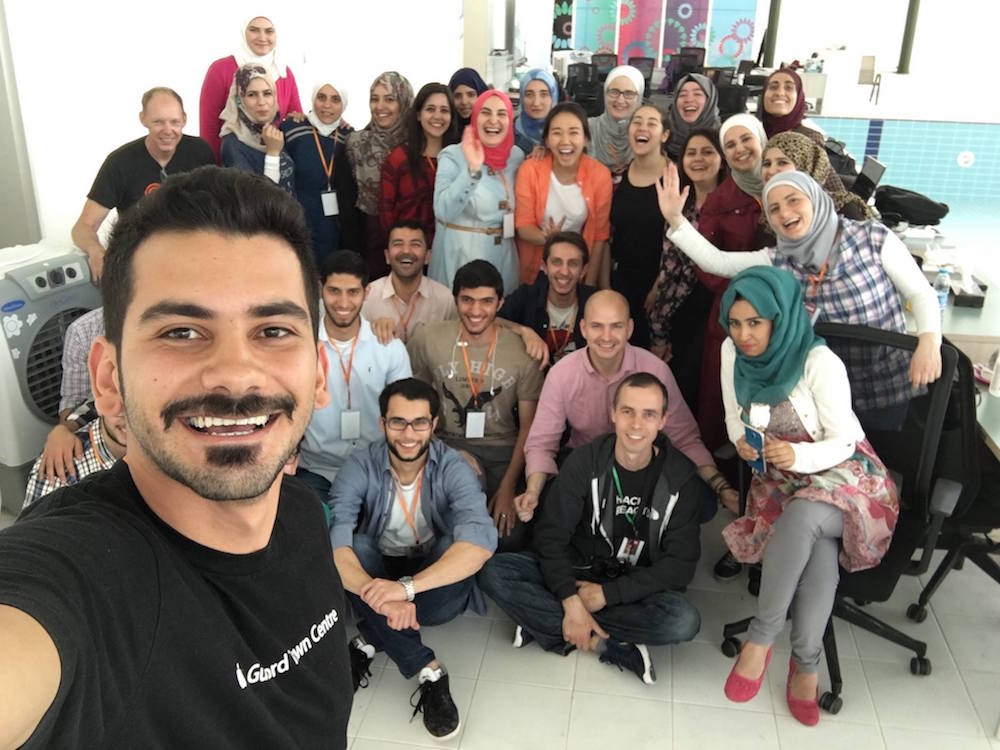Rebootkamp's first wave of refugee coders in Jordan

After fleeing from war torn Taiz, Yemen six months ago, Rwaida Almehanni found herself feeling aimless in Jordan. The 27-year-old wanted to rebuild her life, but didn’t know where to start. In spring of 2016, she encountered Rebootkamp, or RBK, an intensive 16-week training program in Jordan for prospective software engineers, but with a twist - RBK was created specifically to train refugees to code.
Almehanni had studied some computer science while at university in Yemen. She decided to apply. “It’s a chance to start over. When I came here from my country I didn’t know where I could start,” she said.
RBK is designed to give refugees in Jordan that starting point. Cofounded in 2015 by Hugh Bosely and Alaa Kahel, RBK’s program was adapted from the coding “bootcamp” style learning popularized in North America by computer programming schools like Hack Reactor. In Jordan’s refugee population, Bosely saw an immense reserve of potential talent; with the tech industry flourishing globally, demand for market-ready software engineers was skyrocketing.

With thousands of refugees languishing in Jordan in desperate need of opportunities to build a better life, the thinking was simple: why not train refugees to code and set them up with companies needing talent?
Off and running
In May 2016, Almehanni was one of 40 - out of 800 applicants - selected to join RBK’s first cohort, made up of a mixture of Syrian, Iraqi, and Yemeni refugees, as well as a handful of Jordanians. While aimed primarily at refugees, RBK is also open to Jordanians.
RBK’s first bootcamp was hosted at King Hussein Business Park in Amman. It focused on Javascript - a widely used programming language - but also delivered instruction for other subjects, such as Github, HTML, and Salesforce.
At the start of September, after going through a 16-week gauntlet of coding 12 hours a day, six days a week, they graduated.
A brutal schedule, but Bosely said it hasn’t fazed many of them. “Some are hacking 2-3 hours in the morning before we start. They’re hacking after midnight when we leave,” he said.

The course is designed to produce market-ready software engineers and give participants the equivalent of a four-year computer science degree. The course guarantees employment. Regional companies such as Zain, Souq.com and Jabbar are listed as hiring partners.
RBK whittled down the applicants from 800 to a final pool of 100 by using a 180-question examination, a Myers Briggs personality test, and a coding challenge. One hundred applicants passed these, earning a one-hour interview - 40 made it through - 35 showed up on day one.
It’s a diverse bunch. Roughly 60 percent had a background in computer science, including studying it in university. The rest had backgrounds in everything from English literature, advertising, marketing, translation, education, to mechanical engineering. Participant’s ages ranged from 18 to 42.
The industry provides
Jabbar helped cover the costs of the first program, including operational expenses, living expenses (some participants came from as far away as Aqaba and needed lodging), and course tuition. Zain Jordan chipped in as well, providing equipment, workspace, and general support.
Future courses will charge tuition - the amount isn’t set yet, but figures are said to be around $6,000. Bosely noted there will be scholarships available. RBK operates as a non-profit.

Upon graduation, RBK will help place participants with regional companies, including Jabbar and Zain Jordan. According to Bosely, local companies have pledged to hire as many RBK graduates as the program can produce.
RBK is also in the process of launching its own for-profit development company, or “dev-shop”, that will employ graduates. The dev-shop will offer global companies an opportunity to outsource to refugee coders in Jordan.
More than coding
Mohannad Bakkar, from Homs, Syria has been in Jordan since 2012. “Before I joined the program my skills were like zero,” he said. He saw a flier for RBK on Facebook and while he didn’t think studying at a university was an option, he was intrigued by the prospect of becoming a software engineer.
For Bakkar, the technical aspect of RBK is only a small part of the program’s appeal for him. “I’m trying to learn English and program,” he told Wamda.
Bosely stressed that teaching soft skills and producing graduates proficient in English is a fundamental part of RBK. The course isn’t designed to teach English - in fact you have to speak some English to qualify - but its immersive process forces participants to learn skills beyond coding, such as communication skills, adaptability, problem solving, and conflict resolution.
“Largely the gains [by students] have been non-technical,” said Bosely.
Hard and soft skills
To produce graduates proficient in technical (hard) skills as well as soft skills, RBK’s program crams in a lot.

Through the program Almehanni forged her first friendships in Jordan, which she credits with motivating her during the course. That’s a byproduct of RBK’s teaching style, which emphasizes “peer programming,” where students work in pairs to solve problems.
RBK supervisors don’t always assign partners, but when they do they match people of slightly dissimilar skills sets. This forces them to learn not only the curriculum, but how to work together. Throughout the program everyone pairs together at least once, turning the cohort into a community where everyone interacts.
One class down, many to come
RBK has opened the application process for its next two courses, in Amman, and Mafraq, in northern Jordan. They’re expected to begin this fall. RBK’s long-term goal is to expand to other countries affected by crisis.
An ambitious goal, but it’s a start. Just like the start it gave Almehanni - a chance to code her way to a new life.


